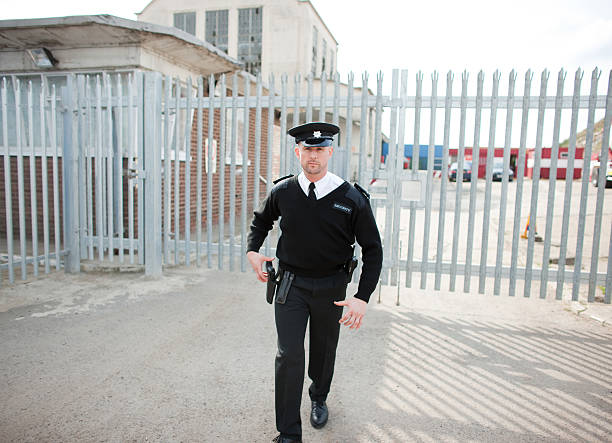Is correctional officer a good job? The role of a correctional officer is one that carries significant responsibility and plays a crucial role in the criminal justice system.
Correctional officers are tasked with maintaining order, safety, and security within correctional facilities, as well as ensuring the well-being of inmates under their supervision.
ooslobet.com
However, when considering a career path, it is natural to question whether being a correctional officer is a good job.
This article explores various aspects of the correctional officer profession to provide a comprehensive understanding of its merits and challenges.
While the decision to pursue a career as a correctional officer is highly personal, it is essential to have an informed perspective.
This article seeks to provide valuable insights, highlighting both the positive aspects and potential drawbacks of the profession.
Whether you are considering a career change, exploring law enforcement options, or simply curious about the role of correctional officers, this article aims to provide the necessary information to help you make an informed decision.
Also Read:
How Many Jobs Are Available in Ordnance and Accessories?
How Many Jobs Are Available in Building Operators?
Is Correctional Officer a Good Job?
The question of whether being a correctional officer is a good job is subjective and can vary depending on individual perspectives.
It is a profession that carries both rewards and challenges, and it is important to consider various factors when evaluating its merits.
One of the primary advantages of working as a correctional officer is the opportunity to make a positive impact on society.
By maintaining order, security, and safety within correctional facilities, these officers play a vital role in ensuring public safety.
They have the chance to contribute to the rehabilitation and reintegration of inmates, helping them turn their lives around and reducing the likelihood of reoffending.
Additionally, correctional officers often benefit from job security and stability.
The demand for these professionals remains relatively constant, providing a sense of reassurance in terms of employment.
Furthermore, the profession offers competitive salaries and benefits packages, ensuring financial stability for those in the field.
However, it is crucial to acknowledge the challenges that come with being a correctional officer.
The job can be physically and emotionally demanding, requiring officers to be prepared for unpredictable situations and potentially dangerous encounters.
The work environment may also be stressful, as officers must navigate tense interactions with inmates and handle conflicts among prisoners.
Moreover, the nature of the profession can take a toll on an officer’s well-being.
High levels of stress, shift work, and exposure to traumatic events can contribute to burnout and mental health challenges.
It is important for correctional officers to have access to comprehensive support systems and resources to help them cope with the demands of their job.
Overall, whether being a correctional officer is a good job depends on individual preferences, values, and priorities.
The opportunity to contribute to public safety and make a positive impact, along with job security and competitive benefits, can be appealing.
However, the physical and emotional demands, as well as the potential impact on well-being, must also be considered.
Ultimately, it is crucial for individuals considering this profession to carefully evaluate their own strengths, interests, and willingness to handle the challenges inherent in the role.
Salary and Benefits in the Correctional Officer Profession
The salary and benefits in the correctional officer profession are often competitive and can provide financial stability.
Correctional officers typically receive a base salary that varies depending on factors such as experience, location, and the employing agency.
Additionally, there may be opportunities for overtime pay and shift differentials.
Benefits commonly include health insurance, retirement plans, paid time off, and various allowances.
These benefits contribute to the overall attractiveness of the profession and help support the well-being of correctional officers and their families.
However, it is important to note that specific salary and benefits can vary across jurisdictions and agencies, so it is advisable to research and consider these factors when evaluating the overall appeal of the correctional officer profession.
Challenges Faced by Correctional Officers
Correctional officers face numerous challenges in their line of work. One major challenge is ensuring the safety and security of both inmates and fellow officers.
They must be prepared to handle conflicts, violence, and potential escapes within correctional facilities.
The demanding and often unpredictable nature of the job can lead to high levels of stress and emotional strain.
Correctional officers may also encounter difficulties in maintaining a healthy work-life balance due to irregular shifts and long hours.
Additionally, they may face negative public perceptions and stigma associated with the profession.
It is crucial for correctional officers to receive proper training, support, and resources to effectively cope with these challenges and maintain their well-being.
Personal Skills and Qualities for Success as a Correctional Officer
Success as a correctional officer requires a specific set of personal skills and qualities.
Firstly, excellent communication skills are vital for effectively interacting with inmates, colleagues, and supervisors.
Strong observational and problem-solving abilities help identify and address security risks or conflicts promptly.
Emotional resilience and the ability to remain calm under pressure are crucial when dealing with potentially volatile situations.
Ethical behavior, integrity, and the ability to maintain professionalism are essential in maintaining trust and credibility.
Adaptability and flexibility are also valuable, as correctional officers often face unpredictable circumstances.
Finally, physical fitness and self-defense skills contribute to the overall effectiveness and safety of correctional officers in their demanding roles.
These skills and qualities enable correctional officers to handle the challenges and responsibilities inherent in the profession while promoting a safe and secure environment within correctional facilities.
Also Read:
How Many Jobs Are Available in Wholesale Distributors?
How Many Jobs Are Available in Miscellaneous?
Conclusion
Whether being a correctional officer is a good job depends on various factors and individual perspectives.
While the profession offers opportunities for making a positive impact on society, job security, and competitive salaries, it also presents challenges such as physical and emotional demands, potential risks, and stress.
It is crucial for individuals considering this career path to carefully evaluate their personal values, strengths, and willingness to navigate the complexities of the role.
Ultimately, a successful and fulfilling career as a correctional officer requires a balance between the rewards of public service and the ability to cope with the demands and challenges inherent in the profession.










